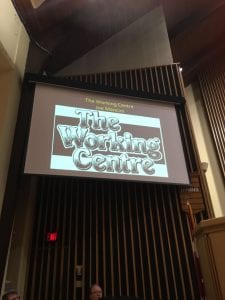

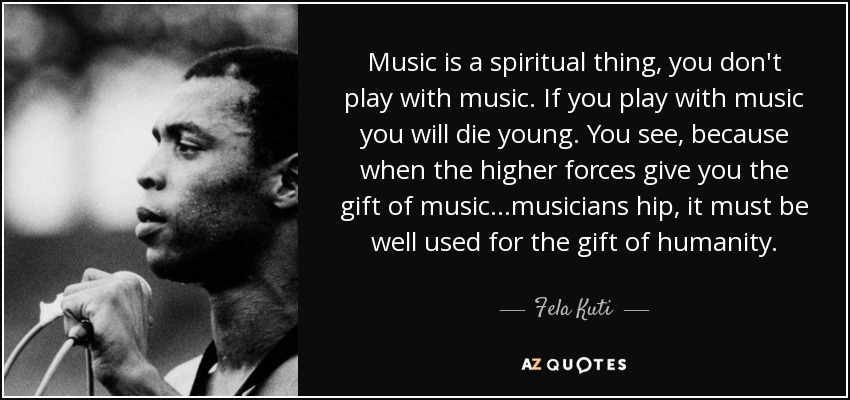
The Mysticism Of Sound And Music – The Sufi Teaching of Hazrat Inayat Khan
True Confession: I did not really want to read this book about the Sufi philosophy on in music, sound, language, and words but I was reluctant to say “no” to Gerard.
I didn’t think that there would be anything in it that would resonate with me. I wished, loudly, several times, that I had picked a different topic. (Full disclosure: It’s because I thought it would be an easy first presentation since my undergrad degree specialized in it. Many philosophers and theologians say that music is close to the spirit and can give a feeling about life that words alone cannot give.)
 I avoided the book. It lay on my piano and I side-stepped around it, eyeing it suspiciously, unwilling to open its pages. However, when I finally did, this is the first thing that I read:
I avoided the book. It lay on my piano and I side-stepped around it, eyeing it suspiciously, unwilling to open its pages. However, when I finally did, this is the first thing that I read:
“I offered this instrument to the divine musician, the only musician existing. Since then I have become his flute and when he chooses he plays his music, the people give me credit for this music which, in reality is not due to me, but to that musician who plays on his own instrument.” (Prologue.)
Wait a minute. This is how I have always felt about my musicianship, especially my compositions, of which I cannot explain the source. Seen through my Christian worldview, I believe they somehow come from God. Reading further, this author again echoes my thoughts in a slightly different way when he talks about inspiration as coming from the divine mind: “It is in the inspiration that one begins to see this sign of God, and the most materialistic genius begins to wonder about the divine spirit.”(pp. 243-244)
Well, now. Driven by curiosity about the creative process, I had ecently read Songwriters On Songwriting by Paul Zollo. He interviewed a large number of famous popular musicians, and surprisingly, many also described a sense that their creative ideas were coming from an outside source.
So, I settled down and read, making notes and seeking to understand the writer’s philosophy/theology. Then I searched out other resources from the WLU library and started seeing links to the topic in other books for the course. With a binder full of notes, how would I express these to you, my beloved co-labourers in this academic and musical endeavour? Behold, my humble attempt, complete with footnotes galore.
Background
The author, Inayat Khan Rehmat Khan Pathan, lived from 1882 – 1927 and founded the Sufi Order in the West in London in 1914. He had initially moved to from India to England as a Northern Indian classical musician. His message of divine unity focused on love, harmony, and beauty, which combined his passion for music to teach that music is the harmonious thread of the Universe (paraphrased from Wikipedia).
Are There Any Skeptics In the House?
Science says that music comes from the body. Mystics say that it comes from the soul.
Mystics of all ages have loved music, and it is central to many religious rituals. My personal experience has been with Christian worship music, where music has an extremely important role, as we sing to, and with, one another making music in our hearts as well as audibly to God. Music was a vital part of the Protestant Reformation because the Reformers felt that the music was being done for them by the professional choirs of the Catholic church and that it needed to be given back to the people.
Higher Call
In many eastern traditions, Nirvana (defined in this book as perfect peace) is attained through music and meditation. By playing, loving and hearing music, we develop music in our personality, thoughts, words and actions, and it brings “the harmony for which the soul yearns and longs.“ (p.8) Could there be a connection between peace within an individual and a peaceful society? Khan writes that music alone will unite the divided souls of races, nations and families. Thus, musicians can have a higher calling: to bring peace and harmony to the world through music.
Music as described a specially divine art because it is the miniature of the laws of rhythm and vibration working through the universe. It is superior to all arts because it raises the soul of man and is essential for spiritual development. It has a magical power and intoxicates listener, player or singer as it touches our deepest part. The eastern view is that music was the first language, therefore, since it was the first expression of the emotions and passions of the heart, it is also the last expression of the emotions and passions of the heart and gives the artist liberty to express his emotions and passion.
 Healing the Frozen Heart
Healing the Frozen Heart
Music is used to warm the frozen heart, to produce feeling, to stop selfishness and coldness. We can train our hearts to feel emotion through music that arouses sorrow, repentance, devotion, joy, humour, or admiration.
Music can heal if life is put into it by the performer or composer. The healing power of music is associated with vibrations and breath. Hindi music realized that a certain way of expressing tone and rhythm brought about a greater emotion or a greater calm and this developed into the practice of yoga, which has become a popular stress-reduction practice in the West. Healing with music is reflected in the Jewish tradition of David soothing King Saul’s distress by playing the harp. In our culture, we now have the field of music therapy and community music therapy. Singing is seen as especially powerful for healing so the singer‘s heart must be prepared with great power of love and sympathy. The author believes it is possible to “tune to the audience” so that the music will touch everyone there. There used to be a tradition in Hindi performances to choose music in the moment based on intuition of what the audience needed to hear.
Hungry?
Sufis use music for purification and prayers, which rises from hearts via music. They call it food for the soul. When the soul is “starving” we have cravings that make us disagreeable, restless, irritated, depressed, and despairing. Have you ever had those type of feelings if you’ve been away from music for too long? I have, and I get a euphoric rush when I have time to compose. This shows that people need and long for music.
Higher Level
If a person does not respond or appreciate music, beauty and art, it is because their soul has not been awakened. But when the spiritual life springs up, “it lightens all of the burden is that a man has. It makes his life smooth, floating on the ocean of life.” (I experienced that floating sensation after this past weekend’s concert, Sing Fires of Justice. I expect that others did, too.)
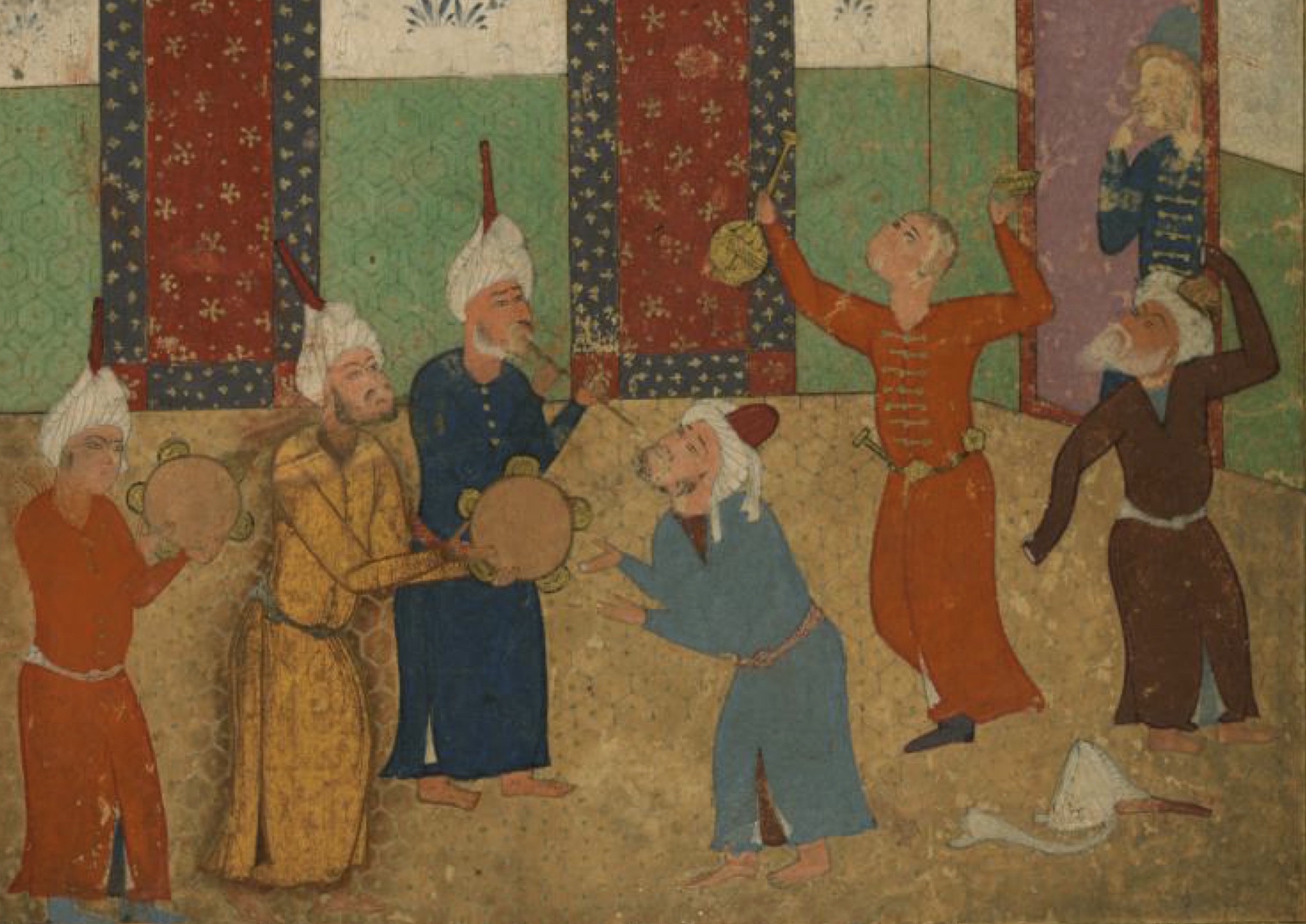 Five different aspects of music are described: Popular (induces body motion), technical (satisfies the intellect), artistic (brings beauty and grace), appealing (pierces the heart), uplifting (soul hears the music of the spheres). I was interested to read that the highest and most ideal form of composition is that which expresses life, character, emotions and feelings, which is the inner world only seen “by the eye of the mind“. Khan says that free composition and improvisation has an important role, and this lines up with a core Community Music tenet.
Five different aspects of music are described: Popular (induces body motion), technical (satisfies the intellect), artistic (brings beauty and grace), appealing (pierces the heart), uplifting (soul hears the music of the spheres). I was interested to read that the highest and most ideal form of composition is that which expresses life, character, emotions and feelings, which is the inner world only seen “by the eye of the mind“. Khan says that free composition and improvisation has an important role, and this lines up with a core Community Music tenet.
In Other Words…
I discovered other resources that described similar concepts using different language, which may be helpful, if the Sufi teaching seems a little bit too “out there”. Some books were weighty, with sentences like this:
“Because of the non-conceptual character of art, there is that’s always a residue that cannot be explained by rationalistic explanations, be they ancient or modern.”
Another book studied “the tingle factor”- a term for what people experience when music takes them beyond themselves,also known as transcendent ecstasy (TE). Is it physical, psychological or spiritual? Some say it’s just the release of endorphins or adrenaline. But could it be more? Music is the most frequently mentioned trigger for TE and is associated with feelings of loss, pain, light, heat, calm, and peace. The poetry of the lyrics can help us to realize and express a sense of yearning and be emotionally cathartic. There is an entire music genre dedicated to helping listeners open up and work on their emotions.
CM Alert: the communal dimension of music contributed to TE (especially if it involved common lyrics, loud music and dancing). Being caught up in the music can produce understanding about ourselves, our world , and how to live in this world.
“The sense of being taken beyond oneself is an essential element in developing a full appreciation of what it means to be human.”

Another resource on the communal aspect of music resonated strongly with me by describing human voices united in community as primary instruments of the “collective soul.” Communal singing is especially powerful because sound of the human voice awakens deeper dimensions and opens the soul to itself. Our cries of anguish or ecstasy can be voiced in a language that moves musically between participants to a profound effect.
Regarding the social/political power of music, Salyers says: “This is raw stuff from the earth and from the heart of the people who yearn to be free… It is a cry that transforms yearning into action. Songs like that move the soul and hence the social body” And also, “Music and song in times of great pain and disorientation illuminate the truth for generations long after.”
It has been said this way: “Together we make up a single choir in perfect equality of rights and of expression whereby earth imitates heaven.”- John of Chrysostom An interesting study was done in Sweden on the physical effect of choral singing, reported with the delightful title When Choirs Sing, Many Hearts Beat As One. It found that singing quickly synchronized their heart rates to the phrasing of their song. A physical, mental, vocal and spiritual unity can be realized through participatory music.
There are so many intriguing aspects to the connection of music to spirituality. It has been an important part of my personal spiritual practice. Clearly, it has meaning and importance for us as Community Musicians as well. I suspect that we should never be surprised when music has an extraordinary effect when it awakens something in us so deeply that “we understand the hope and the fear, the terror and the beauty of life”
Some Thoughts to Ponder
Personal Reflection: What has been your personal experience with the spiritual element of music? When did you find that you were taken outside of yourself through music? Is there a song that touches you in a deep place when you hear it?
Why Does It Matter? Implications for Community Musicians
What is your higher call as a CM?
How can you use your music for healing of yourself, other musicians, your audience, and for reconciliation of man-to-man?
How could your music make others suffer?
How can you “evolve” as a community musician?
Are there ramifications from music being primarily used for entertainment instead of healing?
What could we do differently in light of the spiritual power of music?
“Music can be so deeply changing that we are changed.” (Saylers)
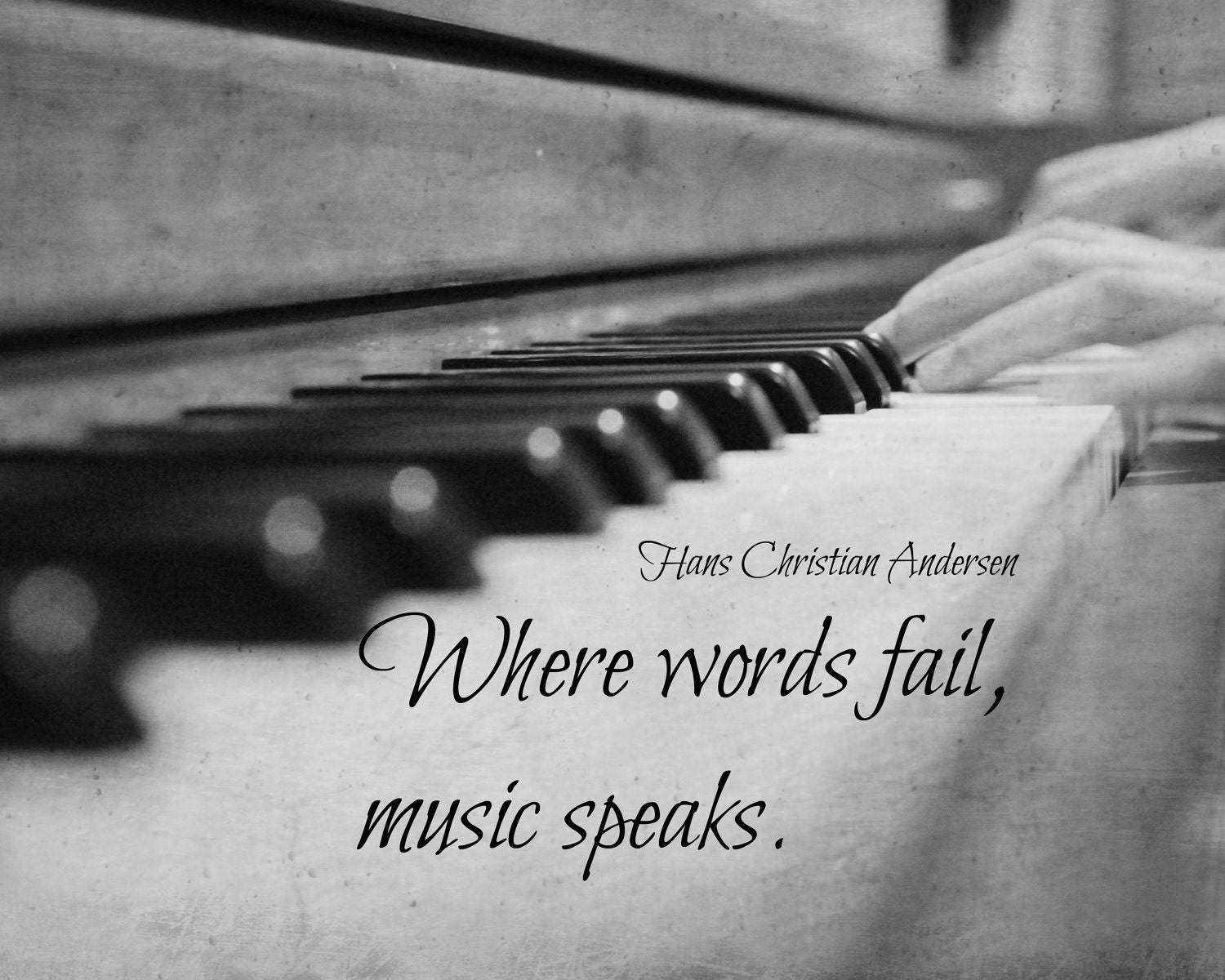

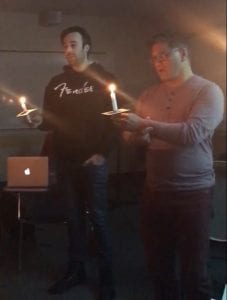

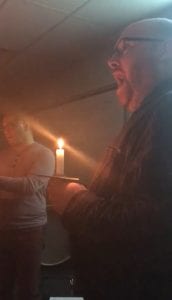



 Book of note: Celtic Modern – a difficult-to-read collection of essays on the global circulation of Celtic music and the place of music in Celtic culture, published in 2003. The editors are Martin Stokes and Philip V. Bohlman who are ethnomusicologists and professors.
Book of note: Celtic Modern – a difficult-to-read collection of essays on the global circulation of Celtic music and the place of music in Celtic culture, published in 2003. The editors are Martin Stokes and Philip V. Bohlman who are ethnomusicologists and professors.









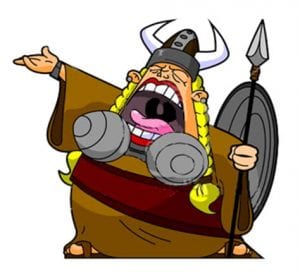

 As some of you know, Saturday night was the Laurier Choirs fall concert, and I have been the TA for the Concert Choir and the Maureen Forrester Singers this term. For the Concert Choir, this has meant meeting one-on-one with students that need extra vocal support for learning their parts. For the Singers, I had the wonderful opportunity to rehearse one of my own compositions with them, which I then conducted at the concert.
As some of you know, Saturday night was the Laurier Choirs fall concert, and I have been the TA for the Concert Choir and the Maureen Forrester Singers this term. For the Concert Choir, this has meant meeting one-on-one with students that need extra vocal support for learning their parts. For the Singers, I had the wonderful opportunity to rehearse one of my own compositions with them, which I then conducted at the concert. I felt intimidated by the presence of the other faculty, conductors and music students. I felt that my conducting techniques were from a different school of conducting (not elaborate, but pragmatic to get the job done and not distract from the choir and the music) and would look unprofessional. I was worried that I’d do something awful like get lost in the score and cue and cut at the wrong times. Or knock my music off the stand.
I felt intimidated by the presence of the other faculty, conductors and music students. I felt that my conducting techniques were from a different school of conducting (not elaborate, but pragmatic to get the job done and not distract from the choir and the music) and would look unprofessional. I was worried that I’d do something awful like get lost in the score and cue and cut at the wrong times. Or knock my music off the stand.
 Once I was in front of everyone, it was fine. It was better than fine. It was great! I am so thankful for this opportunity. A few years ago, I had a major health crisis followed by another major health crisis. At that time, survival and healing were on the forefront. I am now living with a chronic disease that may one day take away my ability to compose, play, conduct.
Once I was in front of everyone, it was fine. It was better than fine. It was great! I am so thankful for this opportunity. A few years ago, I had a major health crisis followed by another major health crisis. At that time, survival and healing were on the forefront. I am now living with a chronic disease that may one day take away my ability to compose, play, conduct.



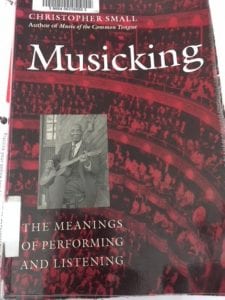 How is this so? The authors say that when you improvise, you break the traditional hierarchy of instrumentation. It should be no surprise that they quote from Small’s “Musicking” a number of times.
How is this so? The authors say that when you improvise, you break the traditional hierarchy of instrumentation. It should be no surprise that they quote from Small’s “Musicking” a number of times.
 “Improvisation demands shared responsibility for participation in community as well as an ability to negotiate differences and a willingness to except the challenges of risk and contingency. And in an era when diverse peoples and communities of interest struggle to forge starkly new forms of affiliation across cultural divide, the participatory and civic virtues of engagement, dialogue, respect, and community building inculcated through improvisatory practises takes on a particular urgency.” (206)
“Improvisation demands shared responsibility for participation in community as well as an ability to negotiate differences and a willingness to except the challenges of risk and contingency. And in an era when diverse peoples and communities of interest struggle to forge starkly new forms of affiliation across cultural divide, the participatory and civic virtues of engagement, dialogue, respect, and community building inculcated through improvisatory practises takes on a particular urgency.” (206)



















 Five different aspects of music are described: Popular (induces body motion), technical (satisfies the intellect), artistic (brings beauty and grace), appealing (pierces the heart), uplifting (soul hears the music of the spheres). I was interested to read that the highest and most ideal form of composition is that which expresses life, character, emotions and feelings, which is the inner world only seen “by the eye of the mind“. Khan says that free composition and improvisation has an important role, and this lines up with a core Community Music tenet.
Five different aspects of music are described: Popular (induces body motion), technical (satisfies the intellect), artistic (brings beauty and grace), appealing (pierces the heart), uplifting (soul hears the music of the spheres). I was interested to read that the highest and most ideal form of composition is that which expresses life, character, emotions and feelings, which is the inner world only seen “by the eye of the mind“. Khan says that free composition and improvisation has an important role, and this lines up with a core Community Music tenet. 



